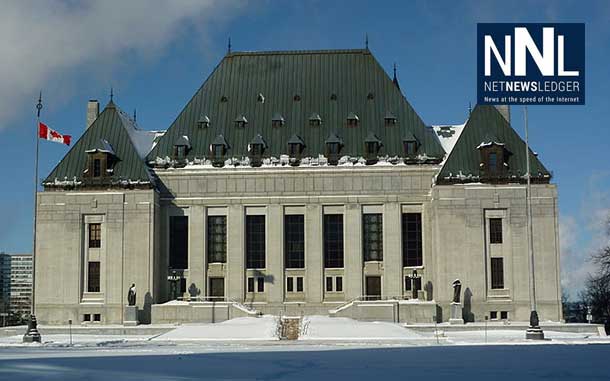 THUNDER BAY – It is a decision that will likely have impact on many aspects of the healthcare sector. The Supreme Court of Canada (SCC) has ruled against the tobacco industry in a landmark case today. It was a unanimous decision in a case that was brought forward by the Government of British Columbia.
THUNDER BAY – It is a decision that will likely have impact on many aspects of the healthcare sector. The Supreme Court of Canada (SCC) has ruled against the tobacco industry in a landmark case today. It was a unanimous decision in a case that was brought forward by the Government of British Columbia.
The BC Government had filed a lawsuit against the tobacco industry seeking compensation, in the billions of dollars for the costs of healthcare attributed to smoking.
The Supreme Court of Canada today unanimously decided that if the tobacco industry is forced to pay damages to the BC government for tobacco-related health care costs, the federal government will not be required to reimburse the tobacco industry for those damages.
“The Government of Canada is pleased with today’s Supreme Court of Canada decision,” stated Leona Aglukkaq, the federal Minister of Health. “The Court’s unanimous decision makes it clear that Canadian taxpayers will not be liable for the claims made against tobacco companies in the cases of Knight and BC Health Care Cost Recovery”.
“Canada is considered a world leader in tobacco control through initiatives such as the Government of Canada’s Cracking Down on Tobacco Marketing Aimed At Youth Act. This government will continue to take action to reduce smoking in Canada and prevent youth from starting to smoke, through efforts such as the proposed new, larger health warning messages on cigarette and little cigar packages,” concluded the Minister.
The tobacco industry countered by naming the federal government as a “third party defendant,” meaning the federal government would potentially have had to pay damages if the tobacco industry loses the case, but this Supreme Court ruling means that cannot happen.
The Canadian Cancer Society praised the Supreme Court judgment, noting that it will also assist other provincial governments seeking compensation from the tobacco industry for health care costs. The Society has for many years urged provincial governments to sue the tobacco industry for tobacco-related health care costs.
“This decision represents a significant defeat for the tobacco industry,” says Rob Cunningham, a lawyer and Senior Policy Analyst with the Canadian Cancer Society. “This industry has long tried to shift the blame to others for the enormous health burden caused by smoking, but the Supreme Court has rejected industry arguments.
“Unfortunately, the Supreme Court of Canada has decided that the federal government is not accountable for its decisions and actions,” said Donald McCarty, Imperial Tobacco Canada’s Vice President of Law. “We nonetheless intend to set the record straight and believe it is important for the government of Canada to answer for its long and sustained involvement in the tobacco industry.”
In 2009, the B.C. Court of Appeal granted Imperial Tobacco Canada the right to include the federal government as a third party in a class action suit against the company to recover the money spent by smokers on “light” or “mild” cigarettes and in the B.C. government’s attempt to recover health care costs from the industry. Today, the Supreme Court of Canada denied this right by overruling this previous judgement and decided that the government of Canada can do no wrong.
“The federal government has known about the risks associated with smoking for decades and they have instigated and promoted the development and sale of “light and mild” products in Canada” added Mr. McCarty. “It is astounding that the government of Canada can step away from its responsibilities and leave tobacco producers to bear the full brunt of these allegations, when it has been fully complicit in all aspects of the manufacturing and marketing of tobacco products for decades,” McCarty concluded.
“With this issue now decided, the BC government can move forward and focus on preparing its case to recover health care costs caused by smoking,” added Cunningham. “It’s time for this case to get to trial. If the tobacco companies lose the BC case and other provincial lawsuits against them, they will be responsible for paying billions of dollars in damages, just as they should be.”
All 10 provinces and Nunavut have adopted legislation to facilitate a medicare cost-recovery lawsuit against the tobacco industry. Four provinces (British Columbia, Ontario, New Brunswick and Newfoundland and Labrador) have filed actual lawsuits, while four others (Alberta, Manitoba, Quebec and Nova Scotia) have announced their intention to file lawsuits. Ontario is seeking $50 billion in damages, while the other provincial lawsuits have not yet specified a total damage amount.
“Provincial governments are to be congratulated for their leadership and determination in taking on the tobacco industry,” adds Cunningham. “Continued determination will result in billions of dollars in compensation for provincial governments and for taxpayers. More importantly, these cases will bring some justice for families who have lost a loved one to a smoking-related disease, while exposing the truth about wrongful industry conduct, and reforming tobacco industry behaviour.”
During the proceedings related to today’s judgment, three provincial governments (BC, Ontario and New Brunswick) argued in support of the federal government.
In similar legal battles in the United States, tobacco companies agreed to out-of-court settlements of US$245.5 billion payable to state governments over 25 years. The cases also resulted in more than 40 million pages of secret tobacco industry internal documents becoming public, and in new restrictions on industry marketing.
And in a separate case also decided today, the Supreme Court unanimously ruled that Imperial Tobacco Canada Ltd. could not name the federal government as a “third party” defendant in a BC class action seeking damages for the misleading marketing of so-called “light” and “mild” cigarettes.
Tobacco products are the leading preventable cause of disease and death in Canada, killing 37,000 Canadians annually. Tobacco products are responsible for about 30 per cent of cancer deaths and for 85 per cent of lung cancers. Lung cancer is the leading cause of cancer death and will kill more than 20,000 Canadians this year.
[ad#Google Adsense 350×250 sidebaradd]






